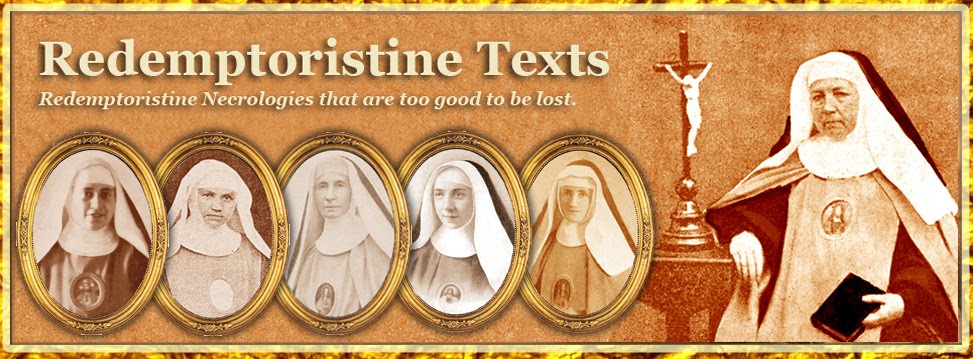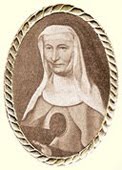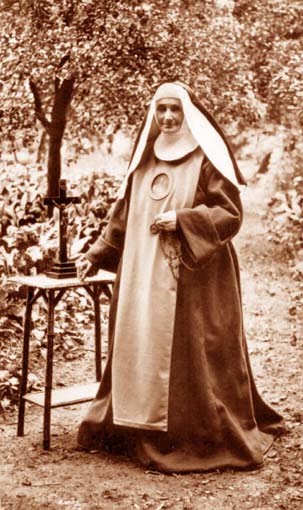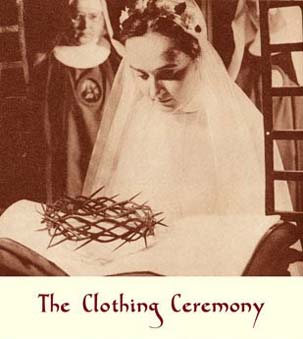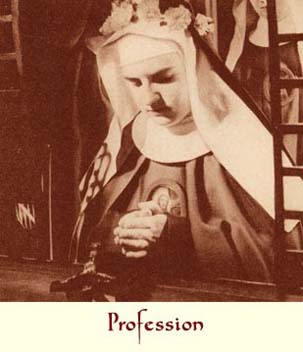Chapter VII.
Mother Mary-Aloyse encourages a Vocation.
Mother Mary-Aloyse encourages a Vocation.
Mother Mary-Aloyse, in the important responsibilities which she exercised, acquired some most useful experience. She made use of it to give the most wise counsels, on occasions, to people of the world. In 1872, one of her nieces, Miss Mathilda Fabri, announced a great news to her. She felt herself called to the religious life and burned to join her pious aunt in the cloister. But her father claimed custody over her youth, and her brothers also had need of her care, so how could she get out of such pressing duties! So from then on, how could she maintain the sacred fire in a life spent in the midst of the world? Mother Mary-Aloyse went to her aid with all her power. Her letters to her niece allow us to reveal her in another light. To the advice which she gave her to show her family the most tender attachment, she joined the advice of a superior prudence, so necessary to safeguard a vocation.
What could be more judicious than her first recommendations? “The more I have prayed,” she writes, “the more it seems to me that God primarily wants you to apply yourself to your interior life, to this union of heart and will with Jesus Christ, who ever holds you in a peaceful and loving dependency. A ruling is no doubt necessary, but the main point must always be one of preferring the will of God to your own exercises, and to sacrifice them generously when He asks you to. I cannot praise you too much for your desire to conform yourself exteriorly to others, and to supplement in your heart and your will for what you cannot do.”
Making an appeal to her own memories, she forewarned her niece against a danger.
“Although I would not wish to advise you to miss out on your sleep, on the contrary, I find that you often sleep too little. Believe me in my experience. I made the same error in the world, and I have had time to repent of it.” Then she laid out for her a little rule of life.
“I would be much happier,” she added, “dear Mathilda, to see you communicate more often, if your confessor will allow it, and if you can do it without anyone finding fault with it. Here, the educands communicate three time a week, the novices four times, without counting the Feasts, and the professed, six times. Try to be at least a novice. I am sure that at Enailles you will have the same sacrifices to make as I had at Sény, because we do not like to be displayed before all the world. So make many, many spiritual communions.” She finishes by telling her about some of Saint Alphonsus’ works.
“I advise you to procure the little treatise Of Mental Prayer and Retreats, and Of the Manner of Conversing Continually with God, by Saint Alphonsus de Liguori. For your meditations, I believe that you will find it very useful to make use of Reflections and Affections on the Passion and Meditations for the Feasts. All these works are by Saint Alphonsus and printed by Casterman (translated by Father Dujardin). These are some little works which will greatly aid you in meditating with confidence, and which are very consoling.” [18]
In another letter, Mother Mary Aloyse initiates her niece into certain practices of religious life, but adapted to her present condition:
“Since you are so fond of doing what we do, dear sister, it is also appropriate for you to have a Patron saint, a practice and a special prayer for the year - we receive it on New Year’s Day. - Your Patron will be Saint Alphonsus, your practice, patience: patience with yourself when you do not make enough progress; patience with others, for even when we live with the angels, we still need patience. And your prayer will be to ask God often for peace, charity and the accomplishment of the duties of religion to always be a distinctive mark of your family. And for this you will say a “Hail Mary” every day.
She again recommended devotion to the Blessed Sacrament. “Try to love Our Lord more in the Blessed Sacrament, and when you are at home, turn from time to time towards the church to greet Him and adore Him and often make spiritual communions. This will do you so much good, especially in moments of pain, when you feel the need to love or be loved! So continue to turn towards the only adorable and desirable good.
“Well, courage, my good child. Jesus loves you very much, you can be sure. Place a high value on the happiness of being the bride of Jesus Christ. Continue to sacrifice yourself in taking care of your father and brothers. For the moment this is certainly the will of God. Make every effort to maintain charity in the family, and Jesus will bless you and love you.” [19]
“Reading your letters, I feel that your are tormenting yourself too much for your faults. Of course we should not love them, but we must live with ourselves and think that our ugliness, borne humbly and in confidence, will not make us disagreeable to our good God, who is so good. As Saint Francis de Sales said, “we must love abjection in order to correct imperfection.”
“I shall place you especially in the Heart of Jesus at seven o’clock in the morning, which is the hour of our holy communion and the Mass, and I shall pray to the Holy Virgin to always be your good Mother.” [20]
The following letter is no less instructive:
“I have prayed so much for you during Christmas night: I asked during the midnight Mass for the Child Jesus to soon open the door of His dear Bethlehem to you, so that we can dwell in it with Him.
“While we are waiting for this wonderful day, dear child, try to become more and more a fervent lover of Jesus Christ in the Blessed Sacrament. This above all is the mark of a Redemptoristine. Do not be content with an ordinary faith, confidence and love, but instead you must establish between yourself and Jesus in the Tabernacle a current of holy affections going from His Heart to your own and from your heart to the Sacred Heart of Jesus. - We learn so many things at the foot of the Tabernacle! There is everything in a consecrated host, so may it be all your treasure, dear Mathilda, your book, your consoler, your confident and your everything. This is one of my most sincere wishes for my good child, whom I desire so much to see all red. Let us hope for it and ask it from the Child Jesus.”
We shall never grow tired of listening to this pious aunt. Here is her judicious advice. “I have to smile, my good little sister, reading these words in your letter: “Everything is going well, but I am so changeable!” Do not forget that your emotions are always changeable. You know that chapter of the Imitation where it is said that we are sometimes sad and sometimes joyful. And we shall be the same until we arrive there, where nothing ever changes. - So this is not a fault, but a misery of our poor nature, which we have to bear with patience. We will never lack crosses or sufferings for as long as we love our good Saviour. He made His daily bread from them, and this must be ours as well.
And she adds, “Try to spend Advent well. It is a time of joy and a time of wishes. The Office is so beautiful! It is a continual sigh calling out to Jesus Christ. If you do not have the Divine Office in French and Latin, I advise you to procure one as complete as possible, and to make use of it sometimes for your meditations. The Advent anthems and the Masses are all so beautiful, and they put us so much into the spirit of the Holy Church! And there is also another advantage, which is that since the Office is drawn almost entirely from Holy Scripture, we are meditating on the words of the Holy Spirit, which always have a particular grace. However, I ask you not to do this without the permission of the Father, who knows you better than I do.”
The letter finishes with come wise recommendations:
“And also try, my good Mathilda, not to go so much against your father. It is better to sacrifice a half-hour of prayers on your knees and pray some other way than to bring down upon yourself some orders or restrictions that you find hard to bear. I have been through that and I know what it means. Once it went as far as wanting to forbid me to confess to the Priest, but I became angry, I wept, I made an uproar so much that they had to leave me alone. It is also true that I made them a terrible threat: If you force me to this, then I will leave even sooner. Then they gave up. But you cannot, must not threaten this. The hour has not come, you can be sure. So be prudent, and see the will of God in the sacrifices He is asking of you.”
In another letter, this good Mother speaks at length on her concern to make family life seem pleasant. Could there ever be anything more judicious, more just, or more like Saint Francis de Sales, if we may so put it, than the following lines?
“You can be sure, my dear child, that our good Saviour will hold you to account for all that you do for Him in sacrificing yourself for the souls of your father and brothers. So try, my good friend, to treat them with the greatest love, and give them a little family pleasure by your well-chosen company, and when there are such gatherings, believe me, do not walk out of them again as you have done. I am sure that your father would have been most upset, and although he may not have said anything to you, he would have spoken about it to others. I heard something about it in Summer through aunt Mathilda, who spoke up for you, however. She also told me that you do not need to go to excess. I have told you this often - be prudent and learn how to make a sacrifice so you do not bring down upon yourself a positive ban on following your exercises. They complain that you are neglecting the housework, that your brothers are always having to rely continually on the servants, since you are never there, that your father is sad and worrying, etc., etc. I know, and I understand that it is very difficult to satisfy everyone, but, my good friend, have you not thought that you will have less graces in praying a little more in your own room and in cutting back somewhat on the time you give to the church, since this is the main complaint?”
She then describes a little rule to her and adds, “So do you not realise that in the convent you will also have to make some of these sacrifices? You often have to learn how to leave God for God, and do His will by leaving the choir when you would be so happy to stay there. So, my dear friend, courage. Fulfil your mission with generosity.”
However, her dear niece went to Lourdes to recommend her vocation to the Immaculate Virgin. “Ah!” she wrote to her from Bruges, “so my little sister is emancipating herself, but in a good manner. I am very happy for you. There you are at the source of graces, so place yourself firmly in the heart of this good Mother. I shall recommend your great desire together with you.”
However, the blessed hour is approaching. We are in July 1878, and in three months the young lady who so generously sacrificed herself for her family, is now about to take flight for the cloister. Her good aunt wants to help her make the right sacrifice now of those to whom up till now she was so devoted to:
“Do not doubt,” she writes to her, “that Jesus and Mary are themselves taking care of those whom you are leaving for their love. The more your sacrifice is generous and full of love, the more abundantly their graces will fall upon your family. So give Jesus and Mary whatever it costs you, often and in advance. After holy communion, offer Our Lord everything you love, Léon, Joseph, Sidonie and all the others, by saying, “My Jesus, I give them to you. Help me to make my sacrifice well so that it will be most agreeable to you. I give you all of them. Make me love you more now that I am leaving them for You. Implore Jesus and Mary for the sentiments that inspired them at Calvary, when you say farewell. Offer this for the soul of your dear Father, [21] and you will see that Our Lord will help you. Tell Him truly that you wish to be a faithful and generous spouse. Then, have confidence. It will cost you, for it will not mean much without it. And soon you will be back at Enailles. You will no longer have the Father [22] to strengthen you, but keep up your prayers. I will send you a copy there of a letter that Mons Dechamps wrote me when I was at Sény. It will please you and do you good.”
From this point on, the correspondence ceases, as the young lady said a last good-bye to the world. She entered the Redemptoristine convent at Bruges.
What could be more judicious than her first recommendations? “The more I have prayed,” she writes, “the more it seems to me that God primarily wants you to apply yourself to your interior life, to this union of heart and will with Jesus Christ, who ever holds you in a peaceful and loving dependency. A ruling is no doubt necessary, but the main point must always be one of preferring the will of God to your own exercises, and to sacrifice them generously when He asks you to. I cannot praise you too much for your desire to conform yourself exteriorly to others, and to supplement in your heart and your will for what you cannot do.”
Making an appeal to her own memories, she forewarned her niece against a danger.
“Although I would not wish to advise you to miss out on your sleep, on the contrary, I find that you often sleep too little. Believe me in my experience. I made the same error in the world, and I have had time to repent of it.” Then she laid out for her a little rule of life.
“I would be much happier,” she added, “dear Mathilda, to see you communicate more often, if your confessor will allow it, and if you can do it without anyone finding fault with it. Here, the educands communicate three time a week, the novices four times, without counting the Feasts, and the professed, six times. Try to be at least a novice. I am sure that at Enailles you will have the same sacrifices to make as I had at Sény, because we do not like to be displayed before all the world. So make many, many spiritual communions.” She finishes by telling her about some of Saint Alphonsus’ works.
“I advise you to procure the little treatise Of Mental Prayer and Retreats, and Of the Manner of Conversing Continually with God, by Saint Alphonsus de Liguori. For your meditations, I believe that you will find it very useful to make use of Reflections and Affections on the Passion and Meditations for the Feasts. All these works are by Saint Alphonsus and printed by Casterman (translated by Father Dujardin). These are some little works which will greatly aid you in meditating with confidence, and which are very consoling.” [18]
In another letter, Mother Mary Aloyse initiates her niece into certain practices of religious life, but adapted to her present condition:
“Since you are so fond of doing what we do, dear sister, it is also appropriate for you to have a Patron saint, a practice and a special prayer for the year - we receive it on New Year’s Day. - Your Patron will be Saint Alphonsus, your practice, patience: patience with yourself when you do not make enough progress; patience with others, for even when we live with the angels, we still need patience. And your prayer will be to ask God often for peace, charity and the accomplishment of the duties of religion to always be a distinctive mark of your family. And for this you will say a “Hail Mary” every day.
She again recommended devotion to the Blessed Sacrament. “Try to love Our Lord more in the Blessed Sacrament, and when you are at home, turn from time to time towards the church to greet Him and adore Him and often make spiritual communions. This will do you so much good, especially in moments of pain, when you feel the need to love or be loved! So continue to turn towards the only adorable and desirable good.
“Well, courage, my good child. Jesus loves you very much, you can be sure. Place a high value on the happiness of being the bride of Jesus Christ. Continue to sacrifice yourself in taking care of your father and brothers. For the moment this is certainly the will of God. Make every effort to maintain charity in the family, and Jesus will bless you and love you.” [19]
“Reading your letters, I feel that your are tormenting yourself too much for your faults. Of course we should not love them, but we must live with ourselves and think that our ugliness, borne humbly and in confidence, will not make us disagreeable to our good God, who is so good. As Saint Francis de Sales said, “we must love abjection in order to correct imperfection.”
“I shall place you especially in the Heart of Jesus at seven o’clock in the morning, which is the hour of our holy communion and the Mass, and I shall pray to the Holy Virgin to always be your good Mother.” [20]
The following letter is no less instructive:
“I have prayed so much for you during Christmas night: I asked during the midnight Mass for the Child Jesus to soon open the door of His dear Bethlehem to you, so that we can dwell in it with Him.
“While we are waiting for this wonderful day, dear child, try to become more and more a fervent lover of Jesus Christ in the Blessed Sacrament. This above all is the mark of a Redemptoristine. Do not be content with an ordinary faith, confidence and love, but instead you must establish between yourself and Jesus in the Tabernacle a current of holy affections going from His Heart to your own and from your heart to the Sacred Heart of Jesus. - We learn so many things at the foot of the Tabernacle! There is everything in a consecrated host, so may it be all your treasure, dear Mathilda, your book, your consoler, your confident and your everything. This is one of my most sincere wishes for my good child, whom I desire so much to see all red. Let us hope for it and ask it from the Child Jesus.”
We shall never grow tired of listening to this pious aunt. Here is her judicious advice. “I have to smile, my good little sister, reading these words in your letter: “Everything is going well, but I am so changeable!” Do not forget that your emotions are always changeable. You know that chapter of the Imitation where it is said that we are sometimes sad and sometimes joyful. And we shall be the same until we arrive there, where nothing ever changes. - So this is not a fault, but a misery of our poor nature, which we have to bear with patience. We will never lack crosses or sufferings for as long as we love our good Saviour. He made His daily bread from them, and this must be ours as well.
And she adds, “Try to spend Advent well. It is a time of joy and a time of wishes. The Office is so beautiful! It is a continual sigh calling out to Jesus Christ. If you do not have the Divine Office in French and Latin, I advise you to procure one as complete as possible, and to make use of it sometimes for your meditations. The Advent anthems and the Masses are all so beautiful, and they put us so much into the spirit of the Holy Church! And there is also another advantage, which is that since the Office is drawn almost entirely from Holy Scripture, we are meditating on the words of the Holy Spirit, which always have a particular grace. However, I ask you not to do this without the permission of the Father, who knows you better than I do.”
The letter finishes with come wise recommendations:
“And also try, my good Mathilda, not to go so much against your father. It is better to sacrifice a half-hour of prayers on your knees and pray some other way than to bring down upon yourself some orders or restrictions that you find hard to bear. I have been through that and I know what it means. Once it went as far as wanting to forbid me to confess to the Priest, but I became angry, I wept, I made an uproar so much that they had to leave me alone. It is also true that I made them a terrible threat: If you force me to this, then I will leave even sooner. Then they gave up. But you cannot, must not threaten this. The hour has not come, you can be sure. So be prudent, and see the will of God in the sacrifices He is asking of you.”
In another letter, this good Mother speaks at length on her concern to make family life seem pleasant. Could there ever be anything more judicious, more just, or more like Saint Francis de Sales, if we may so put it, than the following lines?
“You can be sure, my dear child, that our good Saviour will hold you to account for all that you do for Him in sacrificing yourself for the souls of your father and brothers. So try, my good friend, to treat them with the greatest love, and give them a little family pleasure by your well-chosen company, and when there are such gatherings, believe me, do not walk out of them again as you have done. I am sure that your father would have been most upset, and although he may not have said anything to you, he would have spoken about it to others. I heard something about it in Summer through aunt Mathilda, who spoke up for you, however. She also told me that you do not need to go to excess. I have told you this often - be prudent and learn how to make a sacrifice so you do not bring down upon yourself a positive ban on following your exercises. They complain that you are neglecting the housework, that your brothers are always having to rely continually on the servants, since you are never there, that your father is sad and worrying, etc., etc. I know, and I understand that it is very difficult to satisfy everyone, but, my good friend, have you not thought that you will have less graces in praying a little more in your own room and in cutting back somewhat on the time you give to the church, since this is the main complaint?”
She then describes a little rule to her and adds, “So do you not realise that in the convent you will also have to make some of these sacrifices? You often have to learn how to leave God for God, and do His will by leaving the choir when you would be so happy to stay there. So, my dear friend, courage. Fulfil your mission with generosity.”
However, her dear niece went to Lourdes to recommend her vocation to the Immaculate Virgin. “Ah!” she wrote to her from Bruges, “so my little sister is emancipating herself, but in a good manner. I am very happy for you. There you are at the source of graces, so place yourself firmly in the heart of this good Mother. I shall recommend your great desire together with you.”
However, the blessed hour is approaching. We are in July 1878, and in three months the young lady who so generously sacrificed herself for her family, is now about to take flight for the cloister. Her good aunt wants to help her make the right sacrifice now of those to whom up till now she was so devoted to:
“Do not doubt,” she writes to her, “that Jesus and Mary are themselves taking care of those whom you are leaving for their love. The more your sacrifice is generous and full of love, the more abundantly their graces will fall upon your family. So give Jesus and Mary whatever it costs you, often and in advance. After holy communion, offer Our Lord everything you love, Léon, Joseph, Sidonie and all the others, by saying, “My Jesus, I give them to you. Help me to make my sacrifice well so that it will be most agreeable to you. I give you all of them. Make me love you more now that I am leaving them for You. Implore Jesus and Mary for the sentiments that inspired them at Calvary, when you say farewell. Offer this for the soul of your dear Father, [21] and you will see that Our Lord will help you. Tell Him truly that you wish to be a faithful and generous spouse. Then, have confidence. It will cost you, for it will not mean much without it. And soon you will be back at Enailles. You will no longer have the Father [22] to strengthen you, but keep up your prayers. I will send you a copy there of a letter that Mons Dechamps wrote me when I was at Sény. It will please you and do you good.”
From this point on, the correspondence ceases, as the young lady said a last good-bye to the world. She entered the Redemptoristine convent at Bruges.
Footnotes
[18] April 1872.
[19] January 1873.
[20] December 1873.
[21] Mr. Victor Fabri, who died in the month of June.
[22] Father Fiévez.
[19] January 1873.
[20] December 1873.
[21] Mr. Victor Fabri, who died in the month of June.
[22] Father Fiévez.
This necrology is translated from Fleurs de l'Institut des Rédemptoristines by Mr John R. Bradbury. The copyright of this translation is the property of the Redemptoristine Nuns of Maitland, Australia. The integral version of the translated book will be posted here as the necrologies appear.
